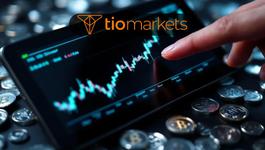A Guide to Trading Commodities: Gold, Oil, and More
BY TIOmarkets
|May 20, 2024Commodity trading offers an exciting opportunity for investors looking to diversify their portfolios. In this comprehensive guide, we will explore the world of commodity trading, with a focus on gold, oil, and other commodities. Whether you are new to trading or an experienced investor, this guide will provide you with the knowledge and tools to navigate the complex world of commodity trading.
Understanding Commodity Trading
Commodity trading refers to the buying and selling of raw materials that are used in daily life. These materials can range from precious metals like gold and silver to energy commodities like oil and natural gas. The goal of commodity trading is to profit from price movements in these markets.
Commodity trading plays a crucial role in the global economy. It enables producers and consumers to hedge against future price fluctuations and ensures a steady supply of essential goods. Additionally, commodity trading provides opportunities for investors to earn returns by speculating on price movements.
One key aspect of commodity trading is the concept of futures contracts. These contracts allow parties to buy or sell a specific quantity of a commodity at a predetermined price at a future date. This helps in managing the risk of price volatility and ensures stability in supply chains.
Moreover, commodity trading is not limited to physical goods only. It also includes trading financial instruments known as commodity derivatives, such as options and swaps. These derivatives derive their value from the underlying commodities and provide investors with alternative ways to participate in the market.
The Basics of Trading Gold
Gold has long been regarded as a safe-haven asset and a store of value. It is traded in various forms, including physical gold, futures contracts, and exchange-traded funds. Understanding how gold trading works is essential for anyone interested in the commodities market.
Trading gold dates back thousands of years, with civilizations such as the Egyptians and the Romans using gold as a form of currency and a symbol of wealth. Today, gold continues to hold its allure, not only for its aesthetic appeal but also for its financial properties.
How Gold Trading Works
Gold trading involves buying and selling gold in different forms. Investors can purchase physical gold in the form of bullion or coins, or they can trade gold futures contracts, which represent an agreement to buy or sell a specified quantity of gold at a predetermined price and date.
Gold trading is not limited to professional investors or institutions. Individual traders can also participate in the gold market through online platforms and brokerages, making it accessible to a wider range of people looking to diversify their investment portfolios.
Factors Influencing Gold Prices
Several factors influence gold prices, including supply and demand dynamics, economic conditions, geopolitical events, and investor sentiment. Understanding these factors can help traders make informed decisions and identify potential trading opportunities.
Central banks play a significant role in the gold market, as they hold a large portion of the world's gold reserves. Changes in central bank policies and decisions regarding gold holdings can have a substantial impact on gold prices and market sentiment.
A Deep Dive into Oil Trading
Oil is one of the most widely traded commodities in the world. Its importance in the global economy and its price volatility make oil trading an attractive option for investors.
When delving into the world of oil trading, it is crucial to understand the various types of oil that are traded, such as Brent crude, WTI crude, and Dubai crude. Each type of oil has its own unique characteristics, including sulfur content, API gravity, and production costs, which can impact its price and trading patterns.
Understanding Oil Market Dynamics
The oil market is influenced by various factors, including global supply and demand, geopolitical tensions, production cuts, economic conditions, and even weather events. For example, hurricanes in the Gulf of Mexico can disrupt oil production and transportation, leading to supply shortages and price spikes. Traders need to stay informed about these factors to make informed trading decisions.
Furthermore, the oil market is also affected by OPEC (Organization of the Petroleum Exporting Countries) decisions regarding production levels and quotas. OPEC plays a significant role in influencing oil prices through its control over a large portion of the world's oil reserves.
Strategies for Trading Oil
Trading oil requires a deep understanding of market dynamics and the ability to analyze price charts and indicators. There are various trading strategies that traders can employ, including trend following, breakout trading, range trading, and fundamental analysis. Each strategy has its own set of rules and risk management techniques, and traders often combine multiple strategies to create a comprehensive trading plan.
Trading Other Commodities
In addition to gold and oil, there are numerous other commodities that can be traded, including agricultural commodities and energy commodities.
When it comes to trading commodities, diversification is key. By expanding your portfolio to include a variety of commodities, you can spread your risk and potentially increase your chances of success. While gold and oil are popular choices for many traders, delving into agricultural and energy commodities can offer a whole new world of trading opportunities.
Trading Agricultural Commodities
Agricultural commodities include wheat, corn, soybeans, and coffee, among others. Trading agricultural commodities requires knowledge of crop cycles, weather patterns, and supply and demand fundamentals. Traders can take advantage of price movements resulting from factors such as weather events, government policies, and global population trends.
For example, understanding the impact of a drought on wheat production or the effects of a trade agreement on soybean exports can provide valuable insights for agricultural commodity traders. By staying informed about market trends and global events, traders can make more informed decisions when it comes to trading agricultural commodities.
Trading Energy Commodities
Energy commodities, such as natural gas and electricity, offer unique opportunities for traders. Factors such as weather conditions, geopolitical events, and supply disruptions can significantly impact energy prices. Traders can use technical analysis, fundamental analysis, and market news to identify potential trading opportunities in the energy market.
For instance, keeping an eye on the hurricane season in the Gulf of Mexico can help energy traders anticipate potential disruptions in oil and natural gas production. Additionally, understanding the impact of political tensions in key oil-producing regions can provide valuable insights for trading energy commodities. By staying informed and conducting thorough research, traders can navigate the complexities of the energy market with more confidence.
Risk Management in Commodity Trading
Commodity trading involves inherent risks, and effective risk management is crucial for successful trading.
Commodity trading is a complex and dynamic market where traders buy and sell raw materials or primary agricultural products. These commodities can include gold, oil, coffee, wheat, and more. The prices of commodities are influenced by various factors such as supply and demand, weather conditions, economic indicators, and geopolitical events.
Identifying and Managing Risks
Identifying and understanding the risks associated with commodity trading is the first step in effective risk management. Risks can include price volatility, market liquidity, geopolitical events, and regulatory changes. Traders should implement risk management strategies such as setting stop-loss orders, diversifying their portfolios, and staying informed about market developments.
Moreover, traders should also consider the operational risks involved in commodity trading, such as technological failures, human errors, and legal risks. By conducting thorough risk assessments and implementing robust risk mitigation strategies, traders can protect their investments and optimize their trading performance.
Tools for Risk Management
There are various tools available to help traders manage risks in commodity trading. These include technical analysis, which involves analyzing price charts and indicators to identify potential trends and reversals, as well as options and futures contracts, which can be used to hedge against potential price movements.
Additionally, risk management software and platforms provide traders with real-time data, risk analytics, and scenario modeling capabilities to make informed trading decisions. These technological tools enable traders to monitor their risk exposure, assess potential outcomes, and adjust their strategies accordingly.
By understanding commodity trading and its various intricacies, investors can confidently navigate the markets and seize opportunities for potential profits. It is important to stay informed, continuously learn, and develop a trading plan that aligns with one's financial goals and risk tolerance. With proper knowledge and risk management, commodity trading can be a rewarding venture for investors seeking diversification and potential returns.
Start Your Commodity Trading Journey with TIOmarkets
Ready to dive into the world of commodity trading? TIOmarkets is here to help you embark on this exciting venture. As a top-rated forex broker and online trading platform, we offer you the opportunity to trade over 300 instruments across 5 markets, including Forex, indices, stocks, commodities, and futures, all with low fees. Join a growing community of over 170,000 traders from more than 170 countries who have chosen TIOmarkets for their trading needs. Enhance your trading skills with our comprehensive educational resources and step-by-step guides. Take the first step towards successful trading by creating a trading account with TIOmarkets today!

Risk disclaimer: CFDs are complex instruments and come with a high risk of losing money rapidly due to leverage. You should consider whether you understand how CFDs work and whether you can afford to take the high risk of losing your money. Never deposit more than you are prepared to lose. Professional client’s losses can exceed their deposit. Please see our risk warning policy and seek independent professional advice if you do not fully understand. This information is not directed or intended for distribution to or use by residents of certain countries/jurisdictions including, but not limited to, USA & OFAC. The Company holds the right to alter the aforementioned list of countries at its own discretion.
Join us on social media

Behind every blog post lies the combined experience of the people working at TIOmarkets. We are a team of dedicated industry professionals and financial markets enthusiasts committed to providing you with trading education and financial markets commentary. Our goal is to help empower you with the knowledge you need to trade in the markets effectively.





